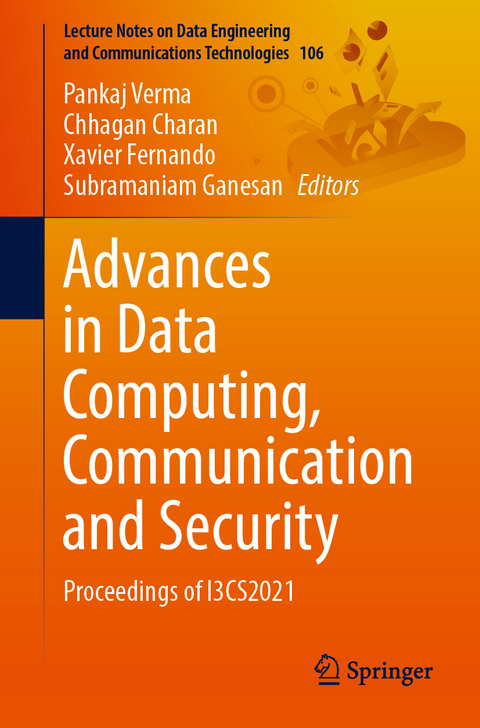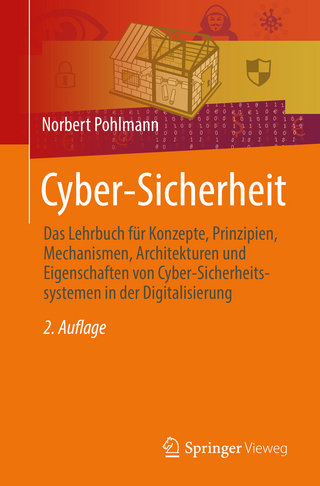
Advances in Data Computing, Communication and Security
Springer Verlag, Singapore
978-981-16-8402-9 (ISBN)
Pankaj Verma received AMIETE (Associate Member of Institute of Electronics and Telecommunication Engineering) degree from Institute of Electronics and Telecommunication Engineers, New Delhi in 2009, M.Tech. in Microwave and Optical Communication from Delhi Technological University (formerly Delhi College of Engineering) 2011 and Ph.D. from National Institute of Technology, Kurukshetra in 2017. He has been awarded Gold Medal in AMIETE (2009). Currently, he is working as Assistant Professor in Electronics and Communication Engineering Department, National Institute of Technology, Kurukshetra, India. He has published several research papers in International/National journals and conferences. He is also having one-year industrial experience in Intellectual Property (IP) domain and earlier served Indian Air Force for three years. He has served as Conference Chair in “International Conference on Cutting-Edge Technologies in Computing and Communication Engineering (IC4E2020). He has also given many expert talks in various institutions across the country and has served as session chairs in many conferences. His research interests are in wireless communications, cognitive radio systems, optical communication, signal processing, visible light communication, security, machine learning, artificial intelligence, and photonics crystal fiber sensors. Xavier Fernando is Professor at the Dept. of Electrical and Computer Engineering, Ryerson University, Toronto, Canada. He has co-authored over 200 research articles, two books (one translated to Mandarin) and holds few patents and non-disclosure agreements. He is Director of Ryerson Communications Lab that has received total research funding of $3,185,000.00 since 2008 from industry and government (including joint grants). He was IEEE Communications Society Distinguished Lecturer and delivered close over 50 invited talks and keynote presentations all over the world. He was Member in the IEEE Communications Society (COMSOC) Education Board Working Group on Wireless Communications. He was Chair IEEE Canada Humanitarian Initiatives Committee 2017-18. He was also Chair of the IEEE Toronto Section and IEEE Canada Central Area. He was General Chair for IEEE International Humanitarian Technology Conference (IHTC) 2017 and General Chair of IEEE Canadian Conference on Electrical and Computer Engineering (CCECE), 2014. He has been in the organizing/steering/technical program committees of numerous conferences and journals. He was Member of Board of Governors of Ryerson University during 2011-12. He is Program Evaluator for ABET (USA). He was Visiting Scholar at the Institute of Advanced Telecommunications (IAT), UK in 2008, and MAPNET Fellow visiting Aston University, UK in 2014. Ryerson University nominated him for the Top 25 Canadian Immigrants award in 2012 in which was a finalist. His research interests are in signal processing for optical/wireless communication systems. He mainly focuses on Physical and MAC layer issues. He has special interest in underground communications systems, cognitive radio systems, visible light communications, and wireless positioning systems. Subramaniam Ganesan is Professor of Electrical and Computer Engineering, Oakland University, Rochester, MI 48309, USA. He has over 25 years of teaching and research experience in Digital systems. He served as Chair of the CSE department from 1991 to 1998. He is with Electrical and Computer Engineering department since 2008. He received his masters and Ph.D. from Indian Institute of Science (IISc) Bangalore, India. He worked at National Aeronautical Laboratory (NAL) India, Ruhr University Germany, Concordia University Canada, and Western Michigan University before joining Oakland University. He is Member of Editorial board of Journal of Computer Science (JCS), International journal of embedded system and Computer Engineering (IJESC), Journal of Concurrent Engineering (CE SAGEpublications), International Journal of Information Technology (IJIT), International Journal of Agile Manufacturing (IJAM), Karpagam Journal of Computer Science (KJCS). He is also acting as Editor-in Chief, International Journal of Embedded system and Computer Engineering and International Journal of Sensors and Applications, South Korea. He has received “Life Time Achievement award” for illustrious career in teaching, research, and administration and contribution to the fields of engineering, conferred by ISAM, USA, in December 2012. He is Distinguished Speaker of IEEE Computer society for 6 years and has visited many countries to give speeches. His research interests include parallel computer architecture, real-time multiprocessor systems for image processing, embedded systems security, DSP processor-based systems and applications, automotive embedded systems and condition-based maintenance, sensor network, mobile protocol and applications, divisible load theory, and applications. Chhagan Charan is working as Assistant Professor in the Department of Electronics and Communication Engineering, National Institute of Technology Kurukshetra, India. From 2011 to 2013, he was employed as System Engineer in Tata Consultancy Services (TCS). He received his B.Tech. (Bachelor of Technology) degree in Electronics and Communication Engineering from the University of Rajasthan, Jaipur in 2009 and M.Tech. degree (Master of Technology) in Microwave and Optical Communication Engineering from Delhi Technological University (DTU), Delhi in 2011. He completed his Ph.D. degree in Electronics and Communication Engineering at National Institute of Technology, Kurukshetra in 2018. He has experience of about 09 years in teaching and industry. He has authored many research papers in International and National journals and conferences. His research interests include cognitive radio networks, NOMA, digital communication, microwave engg., eireless sensor networks, wireless communications, MIMO systems, next generation of communication systems, data computing, and IoT.
TRACK 1: DATA COMPUTING.- Chapter 1. OntoIntAIC: An Approach for Ontology Integration Using Artificially Intelligent Cloud.- Chapter 2. Identifying the Most Frequently Used Words in Spam Mail Using Random Forest Classifier and Mutual Information Content.- Chapter 3. Comparative Analysis of Intelligent Learning Techniques for Diagnosis of Liver Tumor from CT Images.- Chapter 4. A New Model for COVID-19 Detection Using Chest X-Ray Images with Transfer Learning.- Chapter 5. Violence detection in videos using Transfer Learning and LSTM.- Chapter 6. Kernel functions for clustering of incomplete data: A comparative study.- Chapter 7. Neuroimaging (Anatomical MRI) based classification of Alzheimer’s diseases and Mild Cognitive Impairment using Convolution Neural Network.- Chapter 8. Design and Implementation of Stop Words Removal Method for Punjabi Language Using Finite Automata.- Chapter 9. Arrhythmia Fibrillation for Cardiac Disease Classification using Oversampling Method for Multiple Classifiers based on Machine Learning.- Chapter 10. Unsupervised modeling of workloads as an enabler for supervised ensemble-based prediction of resource demands on a cloud.- Chapter 11. A Technique for Find Out Low Frequency Rare Words in Medical Cancer Text Document Classification.- Chapter 12. Image Based Spammer Analysis using Suitable Features Selection by Genetic Algorithm in OSNs.- Chapter 13. An Improved Firefly Algorithm Based Cluster Analysis Technique.- Chapter 14. Stock Market Analysis of Beauty Industry during COVID-19.- Chapter 15. An OWA based feature extraction and ranking for performance evaluation of the players in cricket.
| Erscheinungsdatum | 06.04.2022 |
|---|---|
| Reihe/Serie | Lecture Notes on Data Engineering and Communications Technologies ; 106 |
| Zusatzinfo | 286 Illustrations, color; 66 Illustrations, black and white; XXI, 719 p. 352 illus., 286 illus. in color. |
| Verlagsort | Singapore |
| Sprache | englisch |
| Maße | 155 x 235 mm |
| Themenwelt | Informatik ► Netzwerke ► Sicherheit / Firewall |
| Informatik ► Theorie / Studium ► Künstliche Intelligenz / Robotik | |
| Technik ► Elektrotechnik / Energietechnik | |
| Schlagworte | Communication • Data Computing • Embedded Systems & Processors • I3CS 2021 • I3CS Proceedings • Network and Security • VLSI Design and Materials |
| ISBN-10 | 981-16-8402-2 / 9811684022 |
| ISBN-13 | 978-981-16-8402-9 / 9789811684029 |
| Zustand | Neuware |
| Haben Sie eine Frage zum Produkt? |
aus dem Bereich


